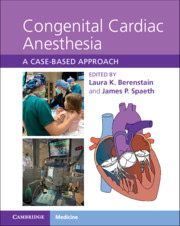Book contents
- Congenital Cardiac Anesthesia
- Congenital Cardiac Anesthesia
- Copyright page
- Dedication
- Contents
- Contributors
- Introduction
- Chapter 1 A Congenital Heart Disease Primer
- Section 1 Left-to-Right Shunts
- Section 2 Right-Sided Obstructive Lesions
- Chapter 6 Critical Pulmonic Stenosis
- Chapter 7 Tetralogy of Fallot
- Chapter 8 Repaired Tetralogy of Fallot
- Chapter 9 Tetralogy of Fallot with Absent Pulmonary Valve Syndrome
- Chapter 10 Tetralogy of Fallot, Pulmonary Atresia, and Aortopulmonary Collaterals
- Chapter 11 Pentalogy of Cantrell
- Chapter 12 Ebstein Anomaly
- Chapter 13 Ebstein Anomaly, Palliated
- Section 3 Left-Sided Obstructive Lesions
- Section 4 Complex Mixing Lesions
- Section 5 Single-Ventricle Physiology
- Section 6 Heart Failure, Mechanical Circulatory Support, and Transplantation
- Section 7 Miscellaneous Lesions and Syndromes
- Index
- References
Chapter 13 - Ebstein Anomaly, Palliated
from Section 2 - Right-Sided Obstructive Lesions
Published online by Cambridge University Press: 09 September 2021
- Congenital Cardiac Anesthesia
- Congenital Cardiac Anesthesia
- Copyright page
- Dedication
- Contents
- Contributors
- Introduction
- Chapter 1 A Congenital Heart Disease Primer
- Section 1 Left-to-Right Shunts
- Section 2 Right-Sided Obstructive Lesions
- Chapter 6 Critical Pulmonic Stenosis
- Chapter 7 Tetralogy of Fallot
- Chapter 8 Repaired Tetralogy of Fallot
- Chapter 9 Tetralogy of Fallot with Absent Pulmonary Valve Syndrome
- Chapter 10 Tetralogy of Fallot, Pulmonary Atresia, and Aortopulmonary Collaterals
- Chapter 11 Pentalogy of Cantrell
- Chapter 12 Ebstein Anomaly
- Chapter 13 Ebstein Anomaly, Palliated
- Section 3 Left-Sided Obstructive Lesions
- Section 4 Complex Mixing Lesions
- Section 5 Single-Ventricle Physiology
- Section 6 Heart Failure, Mechanical Circulatory Support, and Transplantation
- Section 7 Miscellaneous Lesions and Syndromes
- Index
- References
Summary
Ebstein’s anomaly is a rare and highly variable congenital abnormality affecting the tricuspid valve and adjacent right ventricular myocardium. Depending on the degree of apical tricuspid valve displacement, there is loss of effective right ventricular volume and size, with “atrialization” of the right ventricle and right ventricular outflow tract obstruction limiting functional ejection and resulting in decreased pulmonary blood flow. Conduction system abnormalities may also be present in children with Ebstein’s anomaly. Initial management of the newborn with severe Ebstein’s anomaly is focused on maintaining effective pulmonary blood flow and oxygen saturation. Longer term surgical decision making directs the patient toward either a single-ventricle palliation pathway or a two-ventricle repair based on the size and function of the right ventricle. When the size and function of the tricuspid valve and right ventricle are adequate, a two-ventricle repair may be performed. This chapter is focused on the perioperative management of a patient who has undergone staged single-ventricle palliation for Ebstein’s anomaly.
Keywords
- Type
- Chapter
- Information
- Congenital Cardiac AnesthesiaA Case-based Approach, pp. 75 - 82Publisher: Cambridge University PressPrint publication year: 2021

